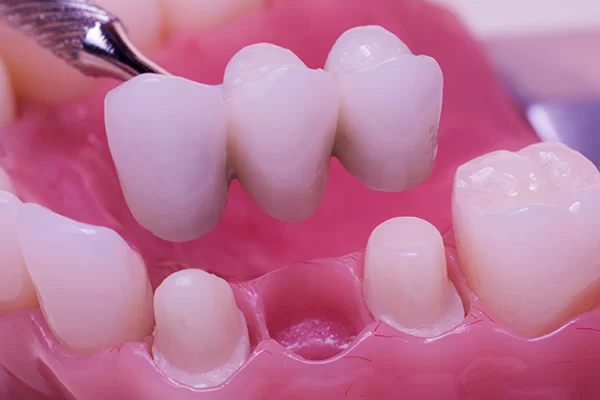
Dental Implants vs Bridges for Missing Teeth: Which is Right for You?
- 1. Understanding Dental Implants and Bridges
- 2. The Benefits of Dental Implants for Missing Teeth
- 3. The Benefits of Dental Bridges for Missing Teeth
- 4. Dental Implants vs Bridges: Cost Considerations
- 5. How to Choose Between Dental Implants and Bridges
1. Understanding Dental Implants and Bridges
When it comes to replacing missing teeth, two of the most popular options are dental implants and dental bridges. Both treatments offer solutions to restore your smile, but they have distinct differences in terms of procedure, longevity, and care.
Dental Implants are a long-term solution where a titanium post is surgically placed into the jawbone, acting as a root for a replacement tooth. The implant is then topped with a crown that matches your natural teeth. Implants are known for their durability and ability to mimic the look and feel of real teeth.
Dental Bridges involve creating a bridge that spans the gap created by missing teeth. A bridge typically consists of two crowns that are placed on the adjacent teeth to support the artificial tooth in the middle. Unlike implants, bridges do not require surgery and can be a quicker option.
2. The Benefits of Dental Implants for Missing Teeth
Dental implants are considered one of the most advanced and reliable options for replacing missing teeth. Here are the key benefits of dental implants:
- Longevity: Implants are designed to last for many years, often up to 25 years or more, making them a durable investment in your oral health.
- Natural Appearance: Implants are designed to look and feel like natural teeth, offering a seamless, aesthetically pleasing solution for tooth loss.
- Preserves Jawbone Health: Because the implant fuses with the jawbone, it helps maintain bone density, preventing the bone loss that often occurs after tooth loss.
- Easy Maintenance: Like natural teeth, implants can be cleaned and cared for with regular brushing and flossing, making maintenance relatively simple.
Overall, dental implants offer a permanent, natural-looking solution that can restore full functionality to your mouth.
3. The Benefits of Dental Bridges for Missing Teeth
While dental implants have a range of advantages, dental bridges offer their own set of benefits, particularly for people who may not be candidates for implants. Here are some of the advantages of choosing a bridge:
- Non-Invasive: Unlike implants, dental bridges don’t require surgery. This makes them an attractive option for those who may not be suitable for surgical procedures due to medical reasons.
- Faster Procedure: The process of getting a dental bridge is generally faster than getting implants, which can take several months to complete due to the healing process.
- Affordable Option: Dental bridges are often more affordable than implants, making them a good option for patients on a budget.
- Immediate Results: After the bridge is placed, the results are immediate. You’ll have a restored smile without waiting for the bone to heal, as is necessary with implants.
While dental bridges may not be as long-lasting as implants, they still provide a reliable solution for missing teeth, especially for those seeking a less invasive procedure.
4. Dental Implants vs Bridges: Cost Considerations
One of the primary factors in choosing between dental implants and bridges is cost. While both options are effective, they differ significantly in price.
- Dental Implants: The cost of a single dental implant can range from $1,500 to $6,000 or more, depending on factors like the location of the clinic, the complexity of the procedure, and whether additional treatments (like bone grafting) are required.
- Dental Bridges: Dental bridges tend to be more affordable, with costs typically ranging from $500 to $2,500 per unit, depending on the material used and the number of teeth being replaced.
While dental implants may have a higher upfront cost, their long-term durability and natural appearance can make them a better investment over time. On the other hand, if you’re looking for a more cost-effective solution with a faster timeline, a dental bridge might be the right option.
5. How to Choose Between Dental Implants and Bridges
Choosing between dental implants and bridges depends on several factors, including your oral health, budget, and personal preferences. Here are some things to consider when making your decision:
- Oral Health: If your jawbone is healthy and you have enough bone density, dental implants are a great option. However, if your jawbone has weakened due to tooth loss, a bridge may be a better solution.
- Cost and Time: Dental implants generally cost more and take longer to complete than bridges. If you’re looking for a quicker and more affordable option, a dental bridge may be the way to go.
- Long-Term Results: If you’re looking for a permanent, long-lasting solution, dental implants are often the better choice. However, if you’re looking for a temporary solution or have a limited budget, a dental bridge may provide the results you need.
Ultimately, the right choice depends on your unique situation. It’s always best to consult with a dental professional to discuss your options and determine the best treatment plan for your needs.
If you’re considering replacing missing teeth, whether with dental implants or bridges, visit Dentistry Toothtruth to explore your options and get expert advice on the best solution for your smile.







 Sunnymead Ranch Dental Center4.0 (465 review)
Sunnymead Ranch Dental Center4.0 (465 review) Courtney Hardin0.0 (0 review)
Courtney Hardin0.0 (0 review) Ramsey Family Dental5.0 (93 review)
Ramsey Family Dental5.0 (93 review) Cain Orthodontics, PC4.0 (95 review)
Cain Orthodontics, PC4.0 (95 review) Birch Lake Dental4.0 (258 review)
Birch Lake Dental4.0 (258 review) Legacy Family Dental4.0 (691 review)
Legacy Family Dental4.0 (691 review) The Importance of Oral Health Education During Pregnancy for a Healthy Pregnancy
The Importance of Oral Health Education During Pregnancy for a Healthy Pregnancy Best Tips for Brushing Your Teeth Properly for Healthy Gums: Essential Techniques for Oral Health
Best Tips for Brushing Your Teeth Properly for Healthy Gums: Essential Techniques for Oral Health Why Skipping Dental Checkups Can Lead to Bigger Oral Health Problems
Why Skipping Dental Checkups Can Lead to Bigger Oral Health Problems Advantages of Porcelain Dental Restorations
Advantages of Porcelain Dental Restorations How Can Diabetes Cause Tooth and Gum Problems? Preventing and Managing Oral Health Issues
How Can Diabetes Cause Tooth and Gum Problems? Preventing and Managing Oral Health Issues Healthy Habits for Promoting Good Oral Health and Hygiene: Tips for a Healthy Smile
Healthy Habits for Promoting Good Oral Health and Hygiene: Tips for a Healthy Smile